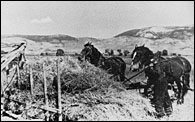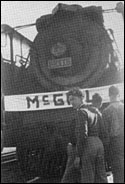Kaleidoscope
Raymond Rashed: From Griddle to Gridiron
 PHOTO: Owen Egan
PHOTO: Owen Egan |
|
On the football field, he's the guy who scrambles your eggs. Off the field, he's the guy who scrambles your eggs.
Fourth year BCom student Raymond Rashed is a big guy from a little province. The PEI native is a defensive end for the McGill Redmen, whose job on the field is to throw his 6'4", 244 lb bulk at other, equally large guys. It's rough work, and dangerous -- Rashed is currently nursing a broken wrist sustained when a 330 lb Laval player landed on him in the season opener.
Tough job? Compare that to what he does over the summer.
At work for five in the morning. Prepares breakfast for the hordes of tourists and locals that come through Sam's Restaurant in Cavendish, PEI. Supervises the staff of over 30 -- many of them students, like he is. Does the books. Makes sure everything goes smoothly until four in the afternoon. Works out for an hour or two to keep in shape for the football season. Goes to bed -- and repeats every day of the summer, including weekends, from June 1 until the start of school.
It's no ordinary summer job. Sam's Restaurant in Cavendish, which Rashed owns with his brother Fadi, has been in operation since 2000. It shares a name with Rashed's father's restaurant in Charlottetown, but don't be mistaken -- Rashed's enterprise was hardly a gift from Dad.
"He told us that there was this location in Cavendish and we should go for it," recalls Rashed.
"We wrote up a business plan, which was 30 pages long, and got two separate loans which came to $170,000."
Rashed said that his education at McGill helped in writing his proposal -- he had done similar exercises in class. This was a lot harder, though.
"Facing these guys, that's the real thing. You really have to know what you're talking about," said Rashed of his loan approval committee.
Loan secured, the hard work began. Although the location was good -- Cavendish is a popular tourist draw, and the beach was nearby -- a lot of work had to go into the place before it was ready for diners. First of all, the space had to be converted from three separate stores into a restaurant that could seat 190 people. Walls had to be knocked out, equipment installed, tables and chairs purchased. Remarkably, the brothers managed to accomplish all of this in just over a month.
That they broke even in their first year, and have posted increasing profits since then, would seem to indicate that the family business is a natural fit. Rashed is not one to put all his eggs in one basket. Despite his success as a restaurateur -- and his academic background in accounting and entrepreneurship -- football is where his passion lies.
"Football I enjoy -- I love going out there, I love going to practice, I love the contact. It's a great sport," he said.
Rashed is facing some tough decisions this year -- again. He transferred to McGill from Univeristy of PEI (which has no football team), picking the Redmen even though he had offers from Acadia and perennial contenders Saint Mary's Huskies. McGill's academics are what swayed his choice.
Now he has an even harder choice. Football is a tough sport to get into, and Rashed's broken wrist -- which he initially tried to play through -- will take him out of the Redmen line-up for six weeks, which means that he won't get a chance to impress coaches or scouts. He does have one more year of eligibility, but that would mean coming back to school after graduating this December.
"This is the big decision -- if I do have a chance, I should come back. But if I don't, I have to start thinking about my future," he said.
 |
||||
|
Security is not defence, defence is not security. The military and their lobbyists decided this was a marvellous crackerjack opportunity to push their issues. |
||||
Foundations
 |
|
October 9, 1942 – Five hundred boisterous students boarded a train in Windsor Station, as described in McGill News, Winter '42. Friends, family, fellow students and well-wishers thronged the platform. One managed to paint "Spirit of McGill" on the lead car. The young men were all prepared to do battle -- but rather than heading east to sail to Europe, the "Spirit of McGill" was bound for Winnipeg and points west.
Just as this summer's "Hay West" project -- in which Eastern Canadian farmers sent railcars full of hay to their drought-stricken Western brethren -- demonstrated Eastern Canada's generosity to Prairie agriculturists, the "Spirit" was bearing volunteer labourers to bring in the Western harvest. The crops were in danger of rotting in the fields due to a shortage of workers, since many of the local boys were overseas fighting.
 PHOTO: McGill Archives
PHOTO: McGill Archives |
|
So dire was the situation that the federal minister of labour declared it a national emergency. An appeal was sent out to the universities -- send us your students to work the fields.
McGill's then Principal, Cyril James, decided that willing students from the Faculties of Arts, Law, and Commerce could be given a leave from their studies. Women were not allowed to go, although many volunteered. Students would be paid four dollars an day, and room and board would be free. In addition, should a student make the voyage west and not find work, the university generously insured the sum of $6 against their return train fare.
Most of McGill's students were assigned to farms in Saskatchewan and immediately put to work -- although not without some difficulty. Some farmers refused to pay the four dollars a day, which was rather high for unskilled labour (one student wrote of the farmers, "They realized that years of study do not exactly fit one for work with a pitchfork").
Then, as now, there were some culture clashes between the farmers and their citified visitors. One winces to read the following writer's condescending assessment of the Westerners:
 PHOTO: McGill Archives
PHOTO: McGill Archives |
|
"Their knowledge of things in general frequently surprised the students, who until then had been accustomed to think of farmers understanding little but agriculture. Instead the Easterners found that the average Westerner could hold forth well on many a subject…"
These problems aside, the program was considered a success. Farmers showed their appreciation by giving gifts to their students. For their part, in addition to gaining an understanding of the West, and helping in a vital war need, McGill's contingent also benefited from the work, "which provided them with heavy exercise they stood in need of, but which, because of their sedentary manner of life, they seldom got."
Welcome to the inaugural article of Reporter's new regular feature, Foundations. This column will look at the history and architecture of McGill—the people and events that shaped the University, and the buildings and embellishments that compose our two campuses.
If you have ideas or suggestions for Foundations, some quirky bit of arcane knowledge, please get in touch with the editorial staff -- our coordinates are in the masthead, p. 2.
 |
||||
|
People hear about black holes, which is matter that has collapsed to oblivion. This is halfway there. It is regular matter that hasn't quite collapsed to the point of being a black hole. It's the object that comes closest to a black hole that can actually be observed and studied, which is why I find them so fascinating. |
||||

